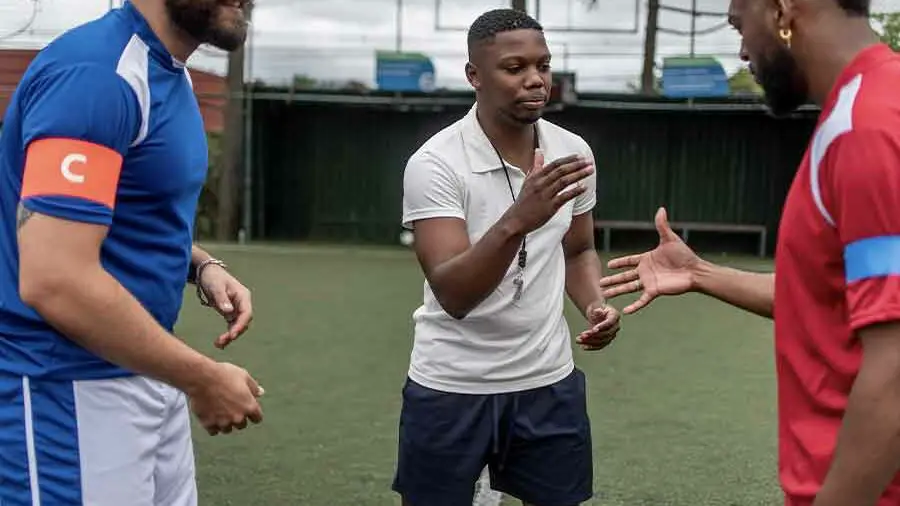Captain
What is a Captain in Soccer?
The captain of a team, also known as the ‘skipper’, is a player chosen to be the on-field leader of the team. Captains are usually the more experienced players on the team, and have the qualities to lead or influence their teammates.
The captain wears an armband to show their position; if a captain gets injured or substituted then the armband is passed to a teammate, usually the designated assistant captain.

What qualities make for a good captain in soccer?
Not every player has what it takes to be a captain. It takes more than just being a good player to lead a team. Here are some of the qualities that make for a good captain in soccer:
- Leadership skills: Captains should be able to inspire and motivate their teammates, while also holding them accountable when necessary. They should lead by example both on and off the field.
- Experience: Captains are usually chosen from among the more experienced players on the team. This is because they have a greater understanding of the game and have been through more high-pressure situations.
- Communication skills: Captains should be able to communicate effectively with their teammates and the referee. They should be able to express their opinions clearly and respectfully.
- Emotional intelligence: Captains should be able to understand and manage their own emotions, as well as those of their teammates. They should be able to remain calm under pressure and help their teammates to do the same.
What are the responsibilities of a captain in soccer?
While the captain’s responsibilities are relatively limited in soccer, they are still important. Here are some of the main responsibilities of a captain in soccer:
- Coin toss: The captain enters the center circle with the opposing captain, referee, and assistant referee for the coin toss. The result of the coin toss determines which team will kick off and which half of the pitch they will start in.
- Referee interaction: During the game, the captain is allowed to approach the referee to discuss certain decisions that affect their team, such as a free-kick awarded against them or a caution being given to a teammate. However, the captain has no authority to interfere or change the decision made. In some cases, referees may approach a captain to discuss their team’s behavior.
- Smaller responsibilities: Captains may also lead their team out onto the pitch at the start of the match or lift trophies won in cup competitions like the World Cup.
It’s worth noting that while the captain has a relatively limited role in terms of on-field responsibilities, they still play a vital role in leading their team both on and off the field. Captains are often seen as the face of their team and are expected to represent their team and their country with pride and honor.
Off the field, a captain is expected to be an ambassador for the club – representing it in a positive way in all public appearances and media engagements.
What are the benefits of having a good captain in soccer?
Having a good captain can make all the difference for a soccer team. Here are some of the them:
- Improved team morale: A good captain can inspire and motivate their teammates, leading to improved team morale and a more positive team culture.
- Better communication: A good captain should be able to communicate effectively with their teammates and the referee, leading to better decision-making and fewer misunderstandings.
- Increased accountability: A good captain should hold their teammates accountable for their actions, leading to improved discipline and focus on the field.
- Improved performance: A good captain can help to improve the performance of their team, leading to better results.
Some Examples of Top-tier Captains
There have been many great captains in the history of soccer, but here are a few who are widely regarded as some of the best:
- Franz Beckenbauer (Germany): Beckenbauer is widely considered one of the greatest defenders of all time and was the captain of the West Germany team that won the World Cup in 1974. He was known for his leadership skills and his ability to inspire his teammates on and off the pitch.
- Dino Zoff (Italy): Zoff was the captain of the Italy team that won the World Cup in 1982, and at the age of 40, he became the oldest player to ever win the tournament. He was known for his calm and composed demeanor on the pitch, which helped to steady his team in high-pressure situations.
- Carles Puyol (Spain): Puyol was the captain of the Spain team that won the World Cup in 2010, and he was widely regarded as one of the best defenders of his generation. He was known for his tenacity and his ability to lead by example on the pitch.
- Roy Keane (Ireland): Keane was the captain of the Manchester United team that won the treble (Premier League, FA Cup, and Champions League) in 1999, and he was known for his fierce competitiveness and his ability to inspire his teammates to perform at their best.
- Didier Deschamps (France): Deschamps was the captain of the France team that won the World Cup in 1998, and he was known for his leadership skills and his ability to organize his team defensively. He has since gone on to become a successful manager, leading France to another World Cup victory in 2018.
Conclusion
The captain of a soccer team is a player who is chosen to lead their team on and off the field. While the captain’s responsibilities are relatively limited, they play a vital role in inspiring and motivating their teammates, communicating effectively with the referee, and holding their teammates accountable.
